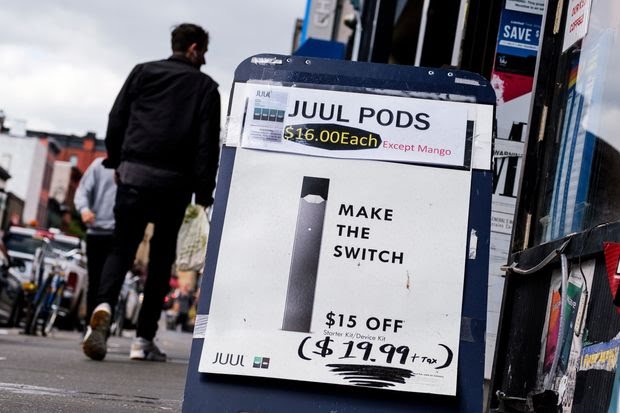
Justin Lane/EPA and Vaping/Shuttershock
President Donald Trump has plans to enact a nation-wide ban on thousands of e-cigarette flavors in response to the growing health crisis among underage vaping.
A federal investigation has revealed hundreds of severe respiratory illnesses and 11 deaths have been reported across the country in relation to e-cigarette use and other vape products.
Vaping is the act of inhaling and exhaling the vapor produced by e-cigarettes and other devices. While they may not produce tobacco smoke, e-cigarettes still produce a vapor that contains fine chemical particles.
Researchers have concluded many of these particles contain toxic substances that have been linked to cancer and other serious health problems. A survey conducted by the FDA in 2014 reveals 81 percent of teenagers who vape cite the flavors of e-cigarettes as a primary factor in their decision to vape.
A growing amount of evidence suggests the chemicals inhaled during vaping can cause serious lung and cardiovascular diseases. The American Lung Association reports a study conducted by the University of North Carolina revealed propylene and vegetable glycerin, the main ingredients in e-cigarettes, are lethal to cells when inhaled. Acrolen, another ingredient used in e-cigarettes, is used to kill weeds and may cause Chronic Obstructive Pulmonary Disease (COPD) and lung cancer.
The dangerous mixing of other toxic chemicals, such as aldehydes and diacetyl, can cause harmful lung diseases.
Earlier in September, Michigan was the first state to ban flavored e-cigarettes, and more reently, New York and Massachusetts have followed suit. Massachusetts’ Governor Charlie Baker has ordered a four-month ban on the sale of flavored e-cigarettes in his state.
Ohio State Rep. Tom Patton has proposed a bill to ban flavored e-cigarettes. The bill would also include the creation of a committee to study the health effects of vaping. Governor Mike Dewine and Ohio Department of Health Director Dr. Amy Acton are working together on the issue.
The Dayton Daily News reports Dewine is researching “whether he has the legal authority to ban liquid flavors used in e-cigarettes as one way to battle against children vaping.”
A federal ban on flavored e-cigarettes could be disastrous for companies like Juul, one of the more popular e-cigarette companies.
Juul CEO Kevin Burns has already stepped down amidst the growing backlash against Juul’s advertising campaigns and the increasing number of illnesses related to vaping. Juul’s incoming CEO, K.C. Crosthwaite, released a statement saying “Juul’s future is at risk due to unacceptable levels of youth usage and eroding public confidence in our industry.”
However, supporters of vaping such as Larry Smith, an employee of Shamrock Vapes, believe the federal ban will not affect his employer’s business as much, since they sell other products.
“Our main focus isn’t necessarily vaping, but companies like Vaperhaus and Vaper Garage in Beavercreek bring in a lot of customers,” said Smith.
Smith says for him, vaping is a much safer choice than regular cigarettes.
“For me, it’s a lot safer than cigarettes. I was a smoker for five-plus years, and I tried quitting and even went cold turkey. The only thing that’s really helped me quit smoking is vaping,” said Smith.
According to Smith, not all e-cigarettes contain nicotine and that there are different levels in vape products.
“It all depends on what you’re used to. It starts zero milligrams that has just vegetable glycerin and goes up incrementally in milligrams of nicotine,” said Smith.
Some students at Wright State University have their own opinions about vaping and the proposed federal ban.
Kris Cruz, a Computer Engineering student at Wright State, does not vape, but he has no qualms about others vaping.
“It’s up to the individual, and it’s their decision. We live in a culture that allows people to do what they want,” said Cruz.
Even so, he finds the federal ban to be unconstitutional.
“The ban will deprive citizens the freedom of what they can do. Vaping is harmless and not as harmful as alcohol and marijuana,” said Cruz. He believes the ban will cause people who vape to get upset because they will not be able to gain access to certain flavors, and it could cause escalation across the country.
Communications major Clare O’Toole believes a nation-wide federal ban may be going too far and banning flavored e-cigarettes should be left up to the state governments.
“People should be careful about vaping. I think people should be allowed to use it if it helps them quit smoking,” said O’Toole. She says if the health issues continue to get worse, then the government should step in.
At Wright State, e-cigarettes and vaping are not allowed on campus, as part of the Tobacco Free Policy created in July of 2017.
